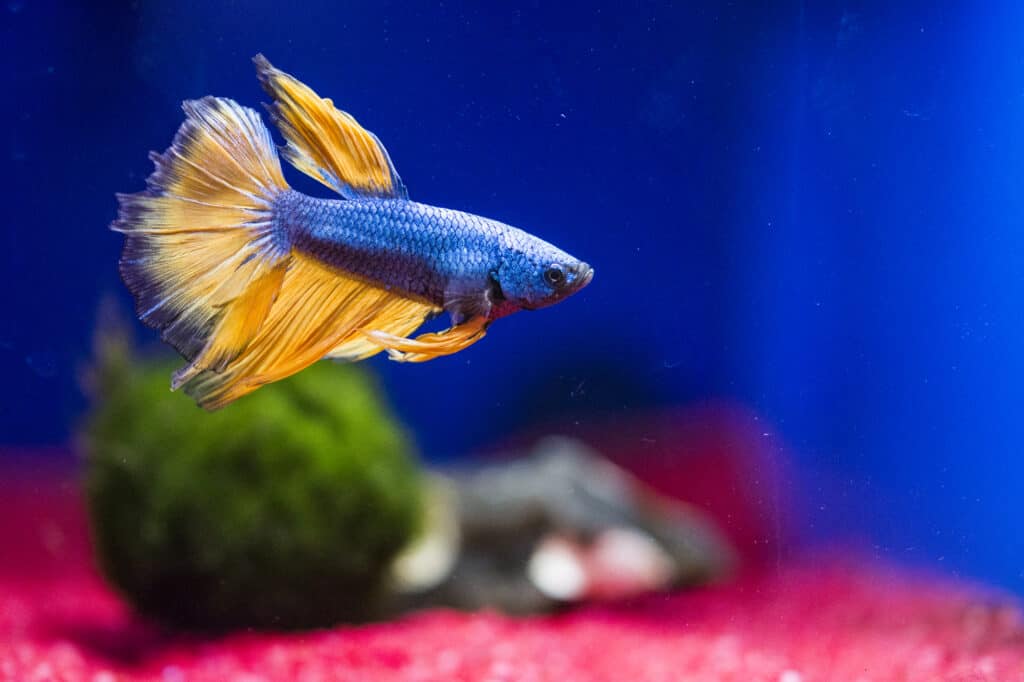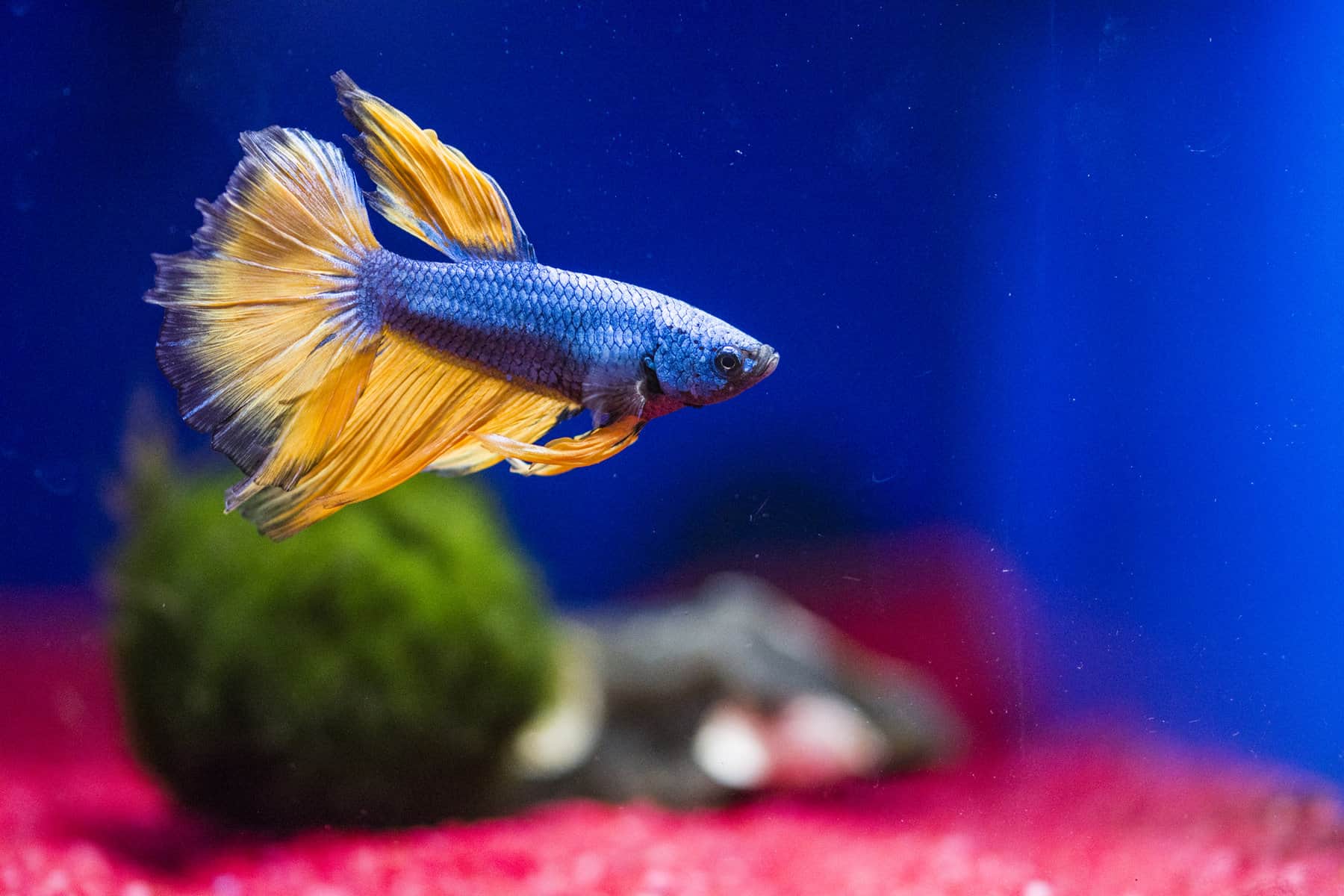If your betta fish spends lots of time by the filter, don’t worry! My last two betta fish had a habit of hanging around the filter box, apparently enjoying the gentle flow from the outlet pipe.
At first, I was concerned there might be something wrong until I figured out why the fish behaved so strangely.
Poor tank conditions could cause your fish’s apparent love of your filter, a lack of hiding places could be responsible, or your fish could even be sick.
It’s really down to you to play detective and work out why your betta buddy is behaving in this way!
Read this guide to learn why your betta buddy spends so much of his time by the filter in your tank.
Why Does Your Betta Fish Stay by the Filter?
There are a number of common reasons why a betta fish might spend much of his day hanging around the filter box or outlet.
Surfing the Water Flow!
Wild betta fish live in stagnant water bodies where there is little to no water current, such as rice paddies, ponds, canals, and water ditches. So, it could be that your betta fish enjoys the gentle flow created by your filter.
Although it sounds like weird behavior for betta fish, I can testify that I regularly witness my betta fish swimming or surfing the flow created by the filter outlet pipe.
Both those fish were veiltails with long, flowing finnage, but they apparently had no problem coping with the filter current. In fact, my fish seemed to love being gently swept aside before swimming back to repeat the experience.
Oxygen-Rich Water
Betta fish belong to the Anabantoidei family of fishes.
These types of fish have a physiological adaptation called the labyrinth organ that enables the fish to breathe atmospheric air as well as absorb dissolved oxygen from the water.
In the wild, the labyrinth organ enables bettas, gouramis, and other Anabantoidei fish to survive in oxygen-deprived waters during periods of drought or in poor water conditions where there’s a lack of oxygen.
In fact, to get plenty of oxygen, betta fish need to use the labyrinth organ to supplement what they can take from the water. The water that comes fresh from your filter system is heavily oxygenated, so understandably, your betta fish will naturally gravitate to that area in search of more dissolved oxygen.
It’s worth noting that lack of oxygen is not generally a problem in well-maintained larger tanks. So, you might want to consider upgrading to a larger tank size if low oxygen levels are a constant problem.
Poor Aquarium Water Conditions
Sometimes, your betta will hang around the filter, searching for fresher, better-quality water if the tank conditions are poor or the water chemistry parameters are off.
So, the first thing I would do if my betta were gravitating to the filter outlet is to check the water quality using an aquarium water test kit.
The levels of ammonia and nitrites in the water must always be zero, while nitrates should be around 20 ppm or lower. If levels of those toxins are too high, you must perform a water change and check that your filter is working properly and the media is clean.
The ideal water parameters for your betta fish should be:
- pH in the range of 6.8 to 7.5
- Water temperature between 76° and 85° F
- Moderately hard water of 6 to 12 GH/100-200 ppm
If the water parameters are outside of these, you’ll need to take steps to adjust them accordingly.
Too Warm?
Bettas are tropical fish that need warm water to survive. However, the warmer the water, the less dissolved oxygen it contains.
So, if your betta’s tank temperature is too high, the oxygen levels in the water might be too low, which could be why your fish is gravitating to the oxygen-rich water around the filter outflow.
Check that your aquarium heater is working correctly. It could be that the thermostat has failed, and the water is now too warm. In that case, replace the heater unit as soon as possible.
If the water temperature is radically different from the ambient room temperature, your betta’s labyrinth organ could be damaged. So, it’s vital you keep a close eye on the temperature in the betta’s tank.
Lack of Hiding Spots
Betta fish like to have plenty of places where they can take short naps and rest throughout the day and at night.
I like to provide my betta with flat leaf plants, caves, a plastic betta hammock, and a few suitable smooth decorations where my fishy friend can chill out when he wants to.
Of course, the top of the filter box makes the ideal resting place for a tired betta! The space is flat, smooth, and surrounded by oxygen-rich water; what more could your betta ask for?
Stress
If your betta is stressed, he might hide behind the filter box.
Of course, if you’ve provided your fish with plenty of caves, dense planting, and the like, he’s more likely to hide there. But in the absence of any alternatives, a stressed betta will sneak behind the filter box for shelter.
Sources of stress for your fish include overcrowding, a very strong current, aggressive tank mates, and even simply arriving in a new tank from the fish store.
Work out what’s stressing your fish, take action to remove it from his environment, and your fishy friend should emerge from hiding.
Sickness
If your betta is sick, he might be trying to find more dissolved oxygen with less effort, so the area around the filter is perfect.
Look carefully for other signs of sickness, including:
- Lethargy
- Faded colors
- Loss of appetite
- Swellings
- Red areas on the skin and fins
- Frayed, torn fins
- White, cottony growths on the head and body
- Obvious parasites clinging to the body, head, and gills
If any of those signs are present, you’ll need to take action to treat your betta fish with an appropriate remedy that you can usually get from your local fish store.
Is the Filter Dangerous for My Betta Fish?
If you have an internal filter system in your fish tank, it is possible that smaller or weak betta fish could be injured if they get pulled into the filter intake.
Although that’s never happened to any of my bettas, these beautiful fish have flowing tail fins that are long and heavy, making swimming difficult.
If your fish’s tail gets sucked into the filter intake, the delicate tissues could become shredded as the betta struggles to escape.
Accident Prevention
Of course, if you can see your betta struggling to swim, you’ll need to make adjustments to your filter system to prevent accidents and relieve stress.
The obvious thing to do is to change the type of filter system you’re using for one that’s more suitable for your betta fish.
- Sponge filters are a good option since they don’t create an especially powerful flow, and their design prevents trailing fins from becoming trapped.
- Undergravel filters are ideal for betta tanks since all their mechanical working parts are situated outside the tank, and the flow they generate is relatively weak.
- A HOB or Hang On Back filter is another good option for betta tanks. Again, these filters have all their moving parts outside the tank, and they can be set to generate a relatively slow flow.
If you don’t want to change your internal filter system, you could try using some sponge or mesh to cover the filter intake so your fish doesn’t get sucked in and injured.
Alternatively, use thick planting or decorations to buffer the flow and redirect your outflow pipe away from your fish.
Provide More Resting Places
You can discourage your betta fish from using the filter box to rest on or hide behind by providing him with plenty of alternative resting places that he can use instead.
Plants
I like to use thick clumps of broad-leaf plants to provide a natural resting spot for my betta. Living plants are great for improving water quality since they extract nitrates as nutrients, take up carbon dioxide, and give off oxygen during photosynthesis. Live plants of all varieties look beautiful, too.
If you prefer to use artificial plants in your betta tank, that’s fine, too. Just make sure you don’t use anything with sharp edges that could harm your betta.
Silk plants are the best choice, and they come in a wide variety of pretty colors and styles that you can use to create a themed look for your betta’s aquarium.
Floating Plants
Bettas love floating plants in their habitat! Floating plants are easy to maintain, don’t require much bright light, and provide dappled shade from high-intensity light conditions.
My betta fish loved to hide and rest among the raft of leaves, and he would regularly build bubble nests there, too, using the leaves and trailing roots as an anchor point for his handiwork.
Just be careful not to use too many floating plants, as they can restrict your betta’s access to the water’s surface, where he needs to feed and breathe using his labyrinth organ.
Betta Hammock
A betta fish hammock is the perfect resting spot for your fishy friend and is an extremely popular choice with many betta enthusiasts.
These tank decorations are inexpensive and can be found in most pet stores and online. A betta hammock consists of a large, soft plastic leaf attached to a suction cup. You stick the suction cup onto the aquarium glass close to the top of the water in a sheltered spot, and your betta will use it whenever he fancies a snooze.
Smooth Decorations
There are lots of fish tank decorations to choose from in your local fish store or pet shop, many of which make perfect betta resting places.
Large flat stones and pieces of driftwood are a good choice, but I would avoid using Dragon rock or twisted roots, both of which can be quite rough and could easily snag your betta’s luxuriant fins.
The same is true of many resin tank ornaments, so before you add any to your fish tank, check them carefully to ensure all the surfaces are smooth, including the inside of caves, bridges, and the like.
Final Thoughts
Did you enjoy our guide on why your betta fish might hang around the filter? If you found the article helpful, please go ahead and hit the share button before you go!
Betta fish stay by the tank filter for many reasons. It could be that your betta is seeking a more oxygen-rich spot, enjoys the gentle flow from the filter outlet pipe, or just likes resting on top of the filter box.
Of course, there could be a more sinister reason for your betta’s inclination to stay by the filter. Perhaps the general poor water quality is responsible, or the parameters are out, you haven’t provided enough resting places for your betta fish, or your pet could be sick.
If your betta stays by the filter in your tank, do you know why he does that? Tell us in the comments box below!

